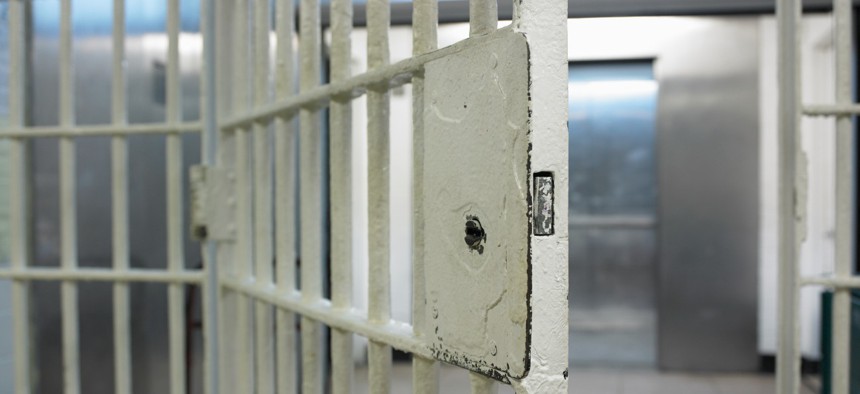
Prisoners face unique barriers to reproductive care, including abortions. Hans Neleman / Getty Images
The Federal Prisons Agency is Reviewing its Reproductive Care Options for Inmates
Prisons and jails “present unique barriers to abortion access," says the Urban Institute, a think tank.
Following the Supreme Court’s decision repealing the almost-half century constitutional right to an abortion, the federal prisons agency is reviewing possible options to protect the reproductive health of its inmates.
The Supreme Court overturned Roe v. Wade on June 24 and since then the White House and various federal agencies have been working to protect abortion and other reproductive healthcare services where they can legally. Abortion is now banned in at least 10 states and restricted in four, with more bans and restrictions expected in the coming weeks, according to a tracker from The New York Times.
“The Bureau of Prisons is reviewing all of the potential policy options for protecting the reproductive health of inmates in our care and custody,” Emery Nelson, BOP spokesperson, told Government Executive on Monday. “While we decline to comment further, we can suggest you visit our ‘Female Offenders’ page on our public website here, for current information on female offenders’ custody and care, including newly published versions of the BOP’s Female Offender Manual.”
Women account for about 7% of the federal inmate population who are housed between 29 facilities, according to BOP’s website. The manual, which was updated in May 2021, says inmates have the responsibility to decide whether they want to have the child or seek an abortion.
“The warden shall offer to provide each pregnant inmate with medical, religious and social counseling to aid her in making the decision whether to carry the pregnancy to full term or to have an elective abortion,” the manual says. “If an inmate chooses to have an abortion, she shall sign a statement to that effect. The inmate shall sign a written statement acknowledging that she has been provided the opportunity for the counseling and information called for in this policy.” After the statements are submitted and received by the appropriate parties, the clinical director arranges for the abortion to happen.
“The bureau assumes all costs associated with the abortion procedure only when the life of the mother would be endangered if the fetus is carried to term, or in the case of rape or incest,” the manual states, due to the Hyde Amendment, which bans the use of federal funds for abortion with a few exceptions including rape or life-threatening conditions. “In all other cases non-bureau funds must be used to pay for any abortion procedure, or else the planned abortion may not be performed. In all cases, however, whether the bureau pays for the abortion or not, the bureau may expend funds to escort the inmate to a facility outside the institution to receive the procedure.”
The manual notes BOP staff who do not want to be involved in facilitating the abortion process must alert their supervisors of this and then supervisors must not order them to take part.
Shortly after the publication of this story, BOP published an updated version of the manual, dated July 8. The only major difference is that there is a strikethrough of the line: “Staff shall have knowledge of, and shall be guided by, applicable federal and state laws and regulations.”
A BOP official told Government Executive, “This policy has been under review for some time for various reasons and any future changes will be posted to our public website under the link.” The official also said it is still accurate that the agency is “reviewing all of the potential policy options for protecting the reproductive health of inmates in our care and custody.”
Prisons and jails “present unique barriers to abortion access,” for reasons such as financial costs, geographic limitations, individuals not being aware of abortion polices and staff refusing requests for abortions, wrote the Urban Institute’s Evelyn McCoy and Azhar Gulaid in May after Politico reported on a leaked draft opinion of the Roe repeal. They referred to a 2017 article from Vice.
Furthermore, “mass incarceration in the United States disproportionately affects communities of color, particularly Black communities that have experienced centuries of disinvestment, overpolicing, and overincarceration that stem from the legacies of slavery and Jim Crow,” wrote McCoy and Gulaid. “Therefore, violations of incarcerated people’s reproductive rights especially affect Black people as they experience high rates of maternal mortality.”
They also noted that individuals of all gender identities can get pregnant and possibly request an abortion and that “LGBTQ+ people have specific and significant reproductive health needs prior to and during incarceration.”
Updated July 12, 10:30 a.m.: Shortly after this story was posted, the Federal Bureau of Prisons published an updated version of its Female Offenders Manual. This story has been updated to reflect that.







